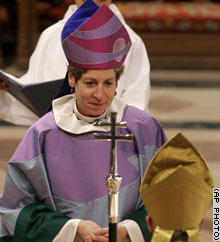Why is Female Leadership So Threatening?

Contiuing with my theme of the "Year of the Woman," I wanted to both celebrate the election of the first female Presiding Bishop of the Episcopalian Church, Katharine Jefferts Schori, and analyze what is a familiar pattern of demonizing women leaders. The Episcopalian church is nearly 400 years old; it did not allow women to become priests, let alone bishops, until 30 years ago. Hence, the election of Jefferts Schori, wherein she won over 6 other candidates is an amazing feat for not only women, but for the direction of the Episcopalian Church. Before turning to ministry, Jefferts Schori was an Oceanographer with the National Marine Fisheries Service in Seattle. She is married to a theoretical mathematician, Richard Miles Schori and they have one daughter, Katharine Johanna, who is a second lieutenant in the Air Force. She is a feminist, supports teaching Evolution, she voted for Gene Robinson, the first gay Bishop of the Episcopalian church, and she supports the blessing of same-sex partnerships.
Echoing my theme from yesterday, when women finally accede to positions of real leadership and authority, everyone benefits from a fresh perspective and different style. However, it is precisely this difference that causes panic, that rouses latent sexist attitudes, and that inspires the more conservative forces to belittle this remarkable woman. 3 diocese have called for a more conservative bishop to preside over them: Quincy, Ill., San Joaquin, CA, and Ft. Worth, Tx. None of these diocese believes that women should be ordained. Conservative pundits characterize her as "eliminating Jesus' teaching." And, of course, she has not healed the deep rifts in the Anglican church over the consecration of a gay bishop.
So, what we have here, is the "Nancy Pelosi" of the Episcopalian church. I don't mean to suggest that they are identical on positions, character, or temperament, but rather they are equally lambasted, mischaracterized, and maligned by not only the predictable conservative forces out there, but by well-meaning individuals who haven't taken a good look at how profoundly entrenched ideas of female leadership threatens them.
While women continue to earn positions of leadership in traditionally male dominated fields, the way that we characterize those leaders belies our lack of faith in their competence. We either paint them as "shrill," in the case of Nancy Pelosi or "fractious" in the case of Katharine Jefferts Schori. If these women, furthermore, stand up for the civil rights of gay people, or fight for women's equality, they are destroying our "American Values." They are, after all, liberal. And, thanks to the success of malicious campaigns against liberal values, to be liberal is to embody everything that is wrong with America.
Jefferts Schori, despite the poisoned well, is focusing on her mission, and hoping it will heal the church. And, if you want to get a sense what sort of dangerous message this liberal female Bishop has to share with the world, read a portion of her sermon, from her investiture on November 4th:
There's a wonderful Hebrew word for that vision and work – shalom. It doesn't just mean the sort of peace that comes when we're no longer at war. It's that rich and multihued vision of a world where no one goes hungry because everyone is invited to a seat at the groaning board, it's a vision of a world where no one is sick or in prison because all sorts of disease have been healed, it's a vision of a world where every human being has the capacity to use every good gift that God has given, it is a vision of a world where no one enjoys abundance at the expense of another, it's a vision of a world where all enjoy Sabbath rest in the conscious presence of God. Shalom means that all human beings live together as siblings, at peace with one another and with God, and in right relationship with all of the rest of creation. It is that vision of the lion lying down with the lamb and the small child playing over the den of the adder, where the specter of death no longer holds sway. It is that vision to which Jesus points when he says, "today this scripture has been fulfilled in your hearing." To say "shalom" is to know our own place and to invite and affirm the place of all of the rest of creation, once more at home in God.
You and I have been invited into that ministry of global peace-making that makes a place and affirms a welcome for all of God's creatures. But more than welcome, that ministry invites all to feast until they are filled with God's abundance. God has spoken that dream in our hearts – through the prophets, through the patriarchs and the mystics, in human flesh in Jesus, and in each one of us at baptism. All are welcome, all are fed, all are satisfied, all are healed of the wounds and lessenings that are part of the not-yet-ness of creation.
That homecoming of shalom is both destination and journey. We cannot embark on the journey without some vision of where we are going, even though we may not reach it this side of the grave. We are really charged with seeing everyplace and all places as home, and living in a way that makes that true for every other creature on the planet. None of us can be fully at home, at rest, enjoying shalom, unless all the world is as well. Shalom is the fruit of living that dream. We live in a day where there is a concrete possibility of making that dream reality for the most destitute, forgotten, and ignored of our fellow travelers – for the castaways, for those in peril or just barely afloat on life's restless sea.


|